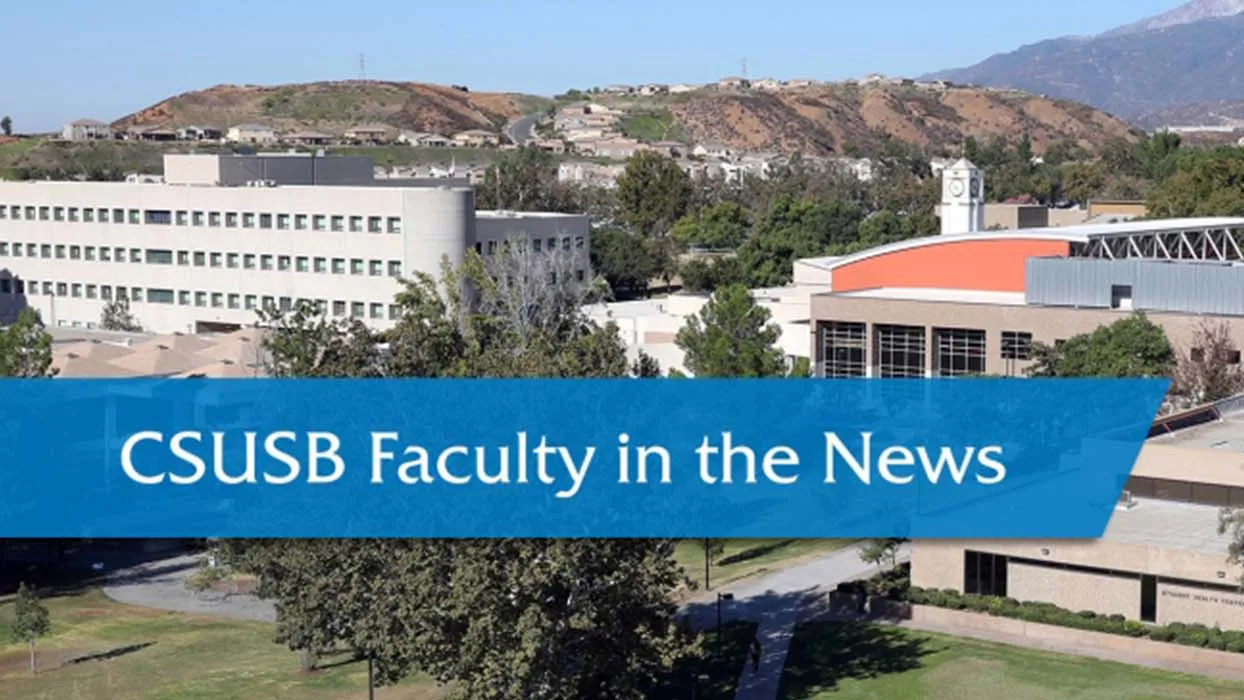NOTE: Faculty, if you are interviewed and quoted by news media, or if your work has been cited, and you have an online link to the article or video, please let us know. Contact us at news@csusb.edu.
Fringe conspiracy theory QAnon is growing overseas, CSUSB professor says
VOA News
Aug. 15, 2020
An article discussing the fringe conspiracy known as QAnon – a belief that U.S. President Donald Trump is secretly battling a “deep state” cabal of pedophiles that control the world – that has gone from an American phenomenon to a global one, included an interview with Kevin Grisham, associate director of CSUSB's Center for the Study of Hate and Extremism.
"At the core of the current interpretation of this ideology, QAnon believes President Trump is the person who will save the world from this network of bad actors and he will uncover the Deep State that exist in the United States and overseas," said Grisham.
The vast majority of the recent growth in QAnon following has taken place overseas.
"You're starting to see these sort of groups popping up everywhere," Grisham said.
Among countries that have seen the largest increases in QAnon activity: Germany, Britain, Australia and Canada, followed by France, Italy and New Zealand.
"The fact that we're seeing it spread all around the world shows its significance for a global audience," Grisham said.
Read the complete article at “How the QAnon conspiracy theory went global.”
TRT World (Turkey)
Aug. 17, 2020
David Yaghoubian, professor of history at California State University, San Bernardino, discusses in a segment on the Turkish public broadcast service newscast the United Nations Security Council’s rejection of the United States bid to extend a global arms embargo on Iran.
“If the intent and goal of the Trump administration was actually have the arms embargo extended, then, indeed, this is a huge, embarrassing abject failure for the Trump administration,” Yaghoubian said. “If, though, as it seems, the goal was to table a resolution that would fail so that the U.S. could go ahead next week and attempt to trigger the snapback of sanctions, then we’ll still have to wait to judge whether this can be considered a success for the Trump administration and its supporters.”
“The goal, I believe, in attempting to trigger the snapback of sanctions … there isn’t any agreement regarding the right or legality of the United States to still make any claims regarding the JCPOA (the Joint Comprehensive Plan of Action) for having pulled out in May of 2018,” he said. It seemed that the U.S. was, Yaghoubian said, “hoping for an existential crisis in the (U.N.) Security Council, which would, at the very least on one level, throw red meat to Donald Trump’s base and the neo-conservatives who generally eschew international law and, as well, international institutions.”
The embargo, which is set to expire on Oct. 18, stems from the JCPOA, the 2015 deal to curb Iran’s nuclear program, The New York Times reported on June 30. President Trump withdrew from the agreement in 2018, and Iran has exceeded the accord’s limits on uranium enrichment since then, part of a steady escalation of tensions that have at times pushed the two countries dangerously close to war.
See the segment at “UN Security Council rejects US proposal to extend Iran arms embargo.”
CSUSB professor discusses balance transfer credit cards
Wallet Hub
Aug. 17, 2020
The personal finance website included a question-and-answer interview with James Estes, CSUSB professor of finance, in its “Ask the Experts” section on a piece about Capital One balance transfer credit cards.
Estes best advice for someone looking for a balance transfer credit card, from Capital One or any other issuer: “If an individual is looking for both balance transfer and 0% APR the only major bank offering this is Citi and I would compare the Annual Percentage Rate of their cards offering these two programs. This is not to say regional banks may also offer both. Interestingly, Citi is the only Bank offering a double program. I would think but have not studied it, that balance transfers would tend to have a higher delinquency rate than non-balance transfer credit cards, but I don't know if Citi has tightened credit requirements for a balance transfer.”
Read the complete article at “Ask the Experts.”
Overuse of phones and devices causing close relationships to atrophy, CSUSB professor writes
Psychology Today
Aug. 17, 2020
Anthony Silard, a CSUSB public administration professor and an award-winning scholar, author and international consultant, wrote an article for the website’s blog about five ways smart phones and related technology are harming our closest relationships.
He wrote, “At this point in our collective history, there seems to be a consensus that the overuse of our phones and devices is causing our close relationships to atrophy. Yet most of us still do not understand how this is happening. In this article, I will attempt to shed light on how our excessive reliance on email, texting, and other forms of text-based communication (IMs, Facebook Messenger, etc.) is causing us to become more distant from the people to whom we were once close.”
Read the complete article at “5 ways your phone is harming your relationships.”
These news clips and others may be viewed at “In the Headlines.”
